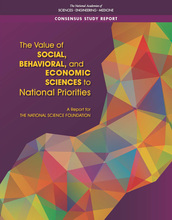News Release 17-062
New report concludes social, behavioral and economic sciences help advance national health, prosperity and defense
National Academies releases 'The Value of Social, Behavioral, and Economic Sciences to National Priorities'

The report concluded SBE research has created tools used by industry to enhance the U.S. economy.
July 18, 2017
This material is available primarily for archival purposes. Telephone numbers or other contact information may be out of date; please see current contact information at media contacts.
At the request of the National Science Foundation (NSF), the National Academies of Sciences, Engineering, and Medicine has produced a report, "The Value of Social, Behavioral, and Economic Sciences to National Priorities." The report concludes that social, behavioral and economic sciences (SBE) further NSF's mission to advance U.S. health, prosperity, welfare and defense.
"Nearly every major challenge the United States faces -- from alleviating unemployment to protecting itself from terrorism -- requires understanding the causes and consequences of people's behavior," the report says.
The National Academies formed an expert committee to consider the value of NSF support for SBE research. The committee found that SBE research produces a fundamental understanding of how people and societies behave that is "critical for the country's well-being."
"The report offers an expert perspective on how we can best work to advance the progress of science," said NSF Director France A. Córdova. "It validates a long-held view of the importance of the social, behavioral and economic sciences. NSF looks forward to working with the scientific community on strategic planning, a key recommendation of the report."
The full report mentions specific examples of NSF-supported SBE research that has advanced welfare, prosperity and security, including the creation of kidney exchange programs, improved cybersecurity and improved counterterrorism efforts.
"Like all sciences, the SBE sciences bring a rigorous, methodological approach to pursuing knowledge," the report states, noting that SBE scientists have contributed new methods of data collection and analysis now used by governments, researchers and business.
The National Academies will host a public discussion Wednesday, July 19, from 9 a.m.-12:30 p.m. EDT at its headquarters at 2101 Constitution Ave. NW, Washington, D.C.
Córdova will provide remarks, and members of the committee will present key findings. A panel of experts will offer brief commentary and engage in a roundtable discussion with committee members about the report recommendations, followed by a general audience discussion.
This event will be webcast live. Further information, including the agenda and registration for this open event, is available on the National Academies website.
-NSF-
Media Contacts
Stanley Dambroski, NSF, (703) 292-7728, email: sdambros@nsf.gov
The U.S. National Science Foundation propels the nation forward by advancing fundamental research in all fields of science and engineering. NSF supports research and people by providing facilities, instruments and funding to support their ingenuity and sustain the U.S. as a global leader in research and innovation. With a fiscal year 2023 budget of $9.5 billion, NSF funds reach all 50 states through grants to nearly 2,000 colleges, universities and institutions. Each year, NSF receives more than 40,000 competitive proposals and makes about 11,000 new awards. Those awards include support for cooperative research with industry, Arctic and Antarctic research and operations, and U.S. participation in international scientific efforts.
Connect with us online
NSF website: nsf.gov
NSF News: nsf.gov/news
For News Media: nsf.gov/news/newsroom
Statistics: nsf.gov/statistics/
Awards database: nsf.gov/awardsearch/
Follow us on social
Twitter: twitter.com/NSF
Facebook: facebook.com/US.NSF
Instagram: instagram.com/nsfgov


